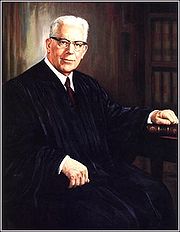
Harper v. Virginia Board of Elections
Encyclopedia
Harper v. Virginia Board of Elections, , was a case in which the U.S. Supreme Court
found that Virginia's poll tax
was unconstitutional under the equal protection clause
of the 14th Amendment
. The Twenty-fourth Amendment to the United States Constitution
prohibited poll taxes in federal elections; the Supreme Court extended this prohibition to state elections.
 In a 6 to 3 vote, the Court ruled in favor of Ms. Harper. The Court noted that “a state violates the Equal Protection Clause of the Fourteenth Amendment to the U.S. Constitution whenever it makes the affluence of the voter or payment of any fee an electoral standard. Voter qualifications have no relation to wealth.”
In a 6 to 3 vote, the Court ruled in favor of Ms. Harper. The Court noted that “a state violates the Equal Protection Clause of the Fourteenth Amendment to the U.S. Constitution whenever it makes the affluence of the voter or payment of any fee an electoral standard. Voter qualifications have no relation to wealth.”
This ruling reversed a prior decision by the Court, Breedlove v. Suttles, , which upheld the state's ability to impose poll taxes, and the Court did so despite the fact that there had been no relevant change in the text of the Constitution between 1937 and 1966. The Twenty-Fourth Amendment, adopted in 1964, outlawed the poll tax in federal elections, but did not speak to the question of state elections, which was the question involved in the Harper case.
Supreme Court of the United States
The Supreme Court of the United States is the highest court in the United States. It has ultimate appellate jurisdiction over all state and federal courts, and original jurisdiction over a small range of cases...
found that Virginia's poll tax
Poll tax
A poll tax is a tax of a portioned, fixed amount per individual in accordance with the census . When a corvée is commuted for cash payment, in effect it becomes a poll tax...
was unconstitutional under the equal protection clause
Equal Protection Clause
The Equal Protection Clause, part of the Fourteenth Amendment to the United States Constitution, provides that "no state shall ... deny to any person within its jurisdiction the equal protection of the laws"...
of the 14th Amendment
Fourteenth Amendment to the United States Constitution
The Fourteenth Amendment to the United States Constitution was adopted on July 9, 1868, as one of the Reconstruction Amendments.Its Citizenship Clause provides a broad definition of citizenship that overruled the Dred Scott v...
. The Twenty-fourth Amendment to the United States Constitution
Twenty-fourth Amendment to the United States Constitution
The Twenty-fourth Amendment prohibits both Congress and the states from conditioning the right to vote in federal elections on payment of a poll tax or other types of tax...
prohibited poll taxes in federal elections; the Supreme Court extended this prohibition to state elections.
Background
The case was filed by Virginia resident Annie E. Harper, who was unable to register without having to pay a poll tax. She brought the suit on behalf of other poor residents and herself. After being dismissed by a U.S. district court, the case went to the United States Supreme Court.The Decision

This ruling reversed a prior decision by the Court, Breedlove v. Suttles, , which upheld the state's ability to impose poll taxes, and the Court did so despite the fact that there had been no relevant change in the text of the Constitution between 1937 and 1966. The Twenty-Fourth Amendment, adopted in 1964, outlawed the poll tax in federal elections, but did not speak to the question of state elections, which was the question involved in the Harper case.

